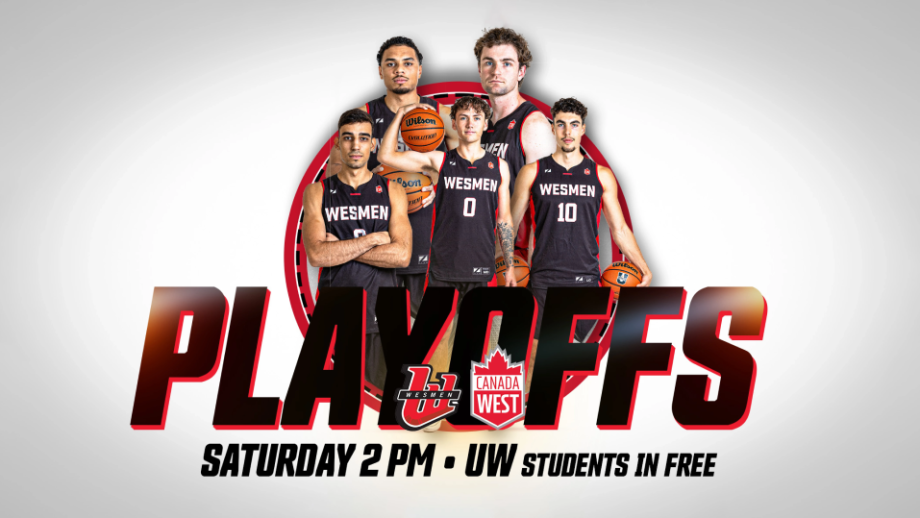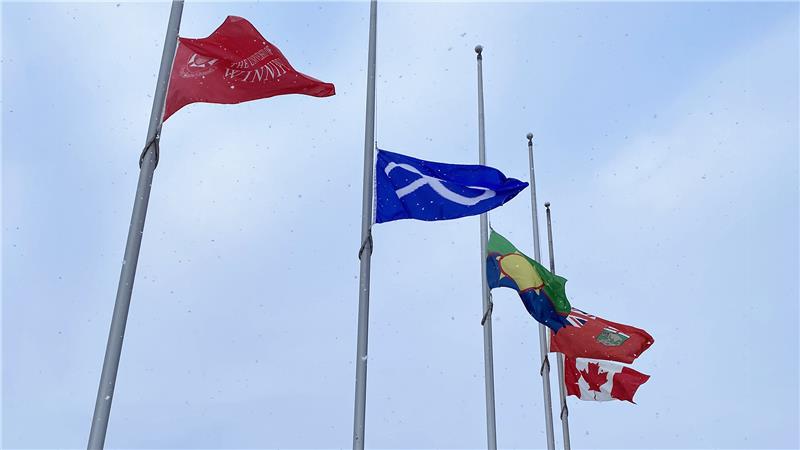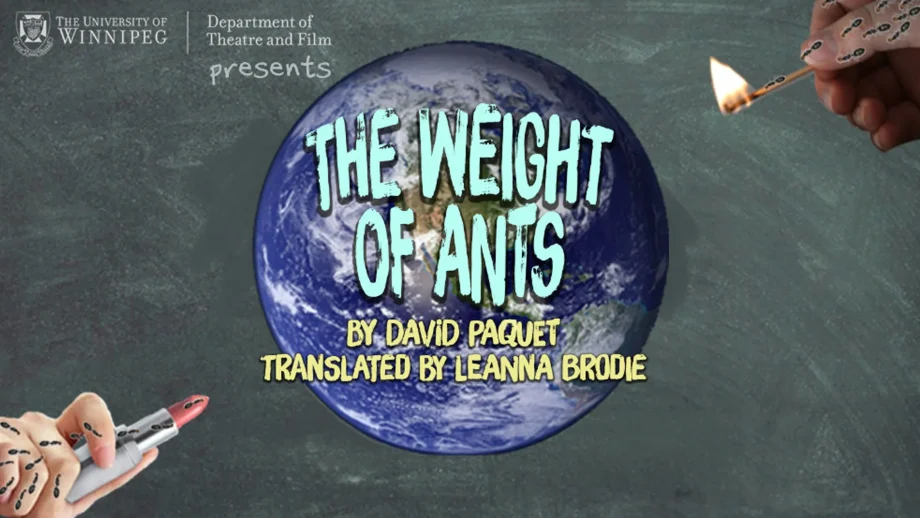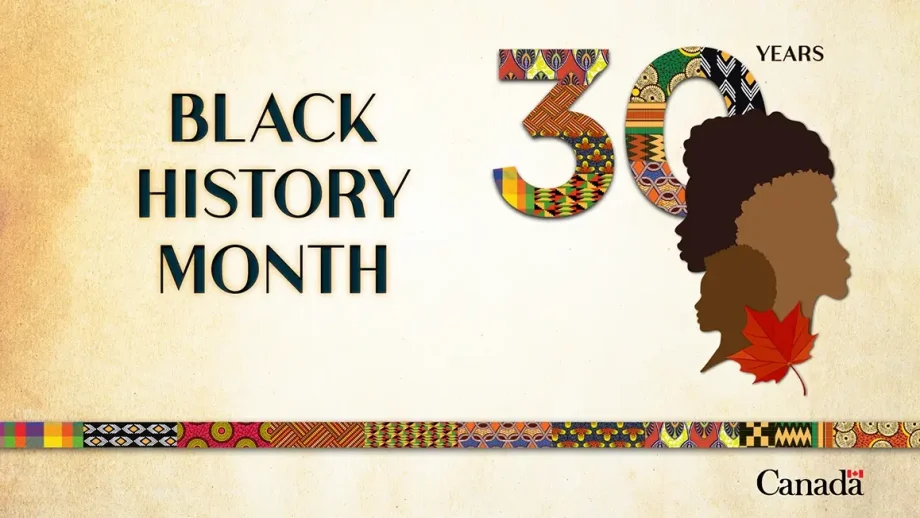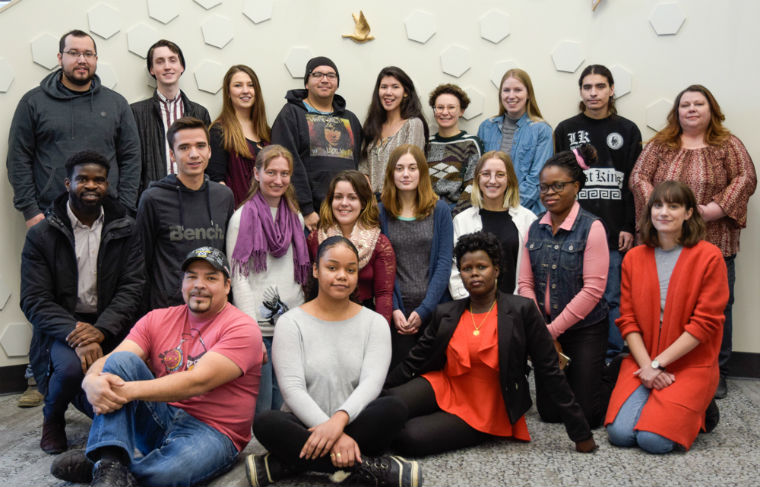
Youth United 2018 class – staff photo
Innovative program aimed at building bridges – read the Winnipeg Free Press story here.
WINNIPEG, MB – Beginning next week, twenty University of Winnipeg students will come together in Winnipeg’s North End to spend the summer learning and working in community organizations, in an innovative program called YouthUnited@Winnipeg. In partnership with the City of Winnipeg, initiated by Winnipeg Councillor Brian Mayes and designed at UWinnipeg, the experiential learning program is based on the principles in the Truth and Reconciliation Commission of Canada (TRC) Calls to Action.
The students come from a diversity of backgrounds, both suburban and inner-city, with the intent of fostering new relationships and the exchange of ideas and perspectives. Students spend one day a week in the classroom, and four days a week working in community-based organizations. The curriculum exposes them to a variety of community settings and cultural experiences.
For student Riley Black (Political Science), YouthUnited is a practical way to engage in community-building and reconciliation. “I’m hoping to gain a greater understanding of life in the inner-city and North End. I think these neighbourhoods are often misrepresented and misunderstood, and I want to be able to challenge these misrepresentations and misunderstandings. I also want to create relationships with a variety of people, so I can better understand and appreciate them and their experiences.”
“This is a wonderful partnership between the City and the University of Winnipeg. We are bringing together students from the different parts of the city to work at service to the community and to learn about reconciliation from one another,” said Mayes. “I am proud to be part of this initiative.”
An innovative aspect of the program is the “roving-classroom” model. In addition to studying at our new home at Merchants Corner, students will learn in community spaces throughout the inner city taught by experienced community practitioners. Participating organizations this year include Ka Ni Kanichihk, Welcome Place, John Howard Society, Peaceful Village, Graffiti Gallery to name a few. Indigenous Elder’s and other Indigenous cultural leaders will provide guidance as students explore what it means to participate in the process of reconciliation through community work.
The program, now in its second year, was designed and is facilitated by Dr. Shauna MacKinnon, Associate Professor and Chair, Urban and Inner-City Studies, UWinnipeg.
“We are honoured and privileged to have support from The City of Winnipeg to allow us to offer this amazing opportunity to students and the community again this year,” said Dr. MacKinnon. “We learned some valuable lessons in our first year and we’ve been busy working to make the program even stronger in its second year. We have a great group of students eager to learn and we are keen to get started.”
YouthUnited@Winnipeg runs for 15 weeks beginning on May 3rd. Students earn six university credits.
Student participant Rebecca Atet Deng (Human Rights and Conflict Resolution).
“I arrived in Canada 12 years ago under refugee status and then become a Canadian citizen. I would like to share some of the challenges immigrants face when they arrive. Social distress is one of the main factors within immigrant communities, especially in the families, many of whom were living in refugee camps. Some children arrive in Canada and never attended school in their homeland or in the refugee camps due to the war. Also, my journey and life experience as a former war survivor will make it easier for me to relate to the issues affected by youth and women of various background, especially First Nations and minorities.”
– 30 –
*NOTE: Dr. Shauna MacKinnon (204-988-7197); and Councillor Brian Mayes (204-986-5088) are available for media interviews.
MEDIA CONTACT
Diane Poulin, Senior Communications Specialist, The University of Winnipeg
P: 204.988.7135, E: d.poulin@uwinnipeg.ca
YOUTH UNITED@WINNIPEG 2018 – MEET THE STUDENTS (photos by UWinnipeg staff)
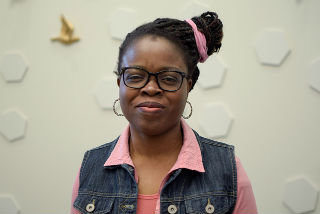
Idowu Adeogun
Idowu Adeogun, 39 years old – Urban and Inner-City Program (double major) graduating 2020
I am an immigrant from Nigeria, hoping to learn, gain and add to my knowledge. I have a desire to help communities and I am very happy that I am one of the successful participants in YouthUNited@Winnipeg this year. This is an opportunity for me to learn more about Truth and Reconciliation, to rectify the legacy of residential schools, and understand the impact of colonization on Indigenous Peoples. Also, reducing inequality in the communities is one of my priorities because inequality hurts a lot. My goal is to be productive and have a positive impact in communities because my future career is Community/Social Programming.
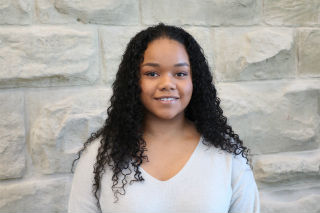
Chelsea Bannatyne
Chelsea Bannatyne, 21 years old, Human Rights & Urban and Inner City Studies, graduating 2020.
I was born in Winnipeg, raised in the West End, and identify as an Afro-Indigenous woman. I have always had a particular interest in Indigenous studies, conflict resolution, social policy and politics as they interconnect closely to lived experiences with respects to human rights.
I am eager to begin the YouthUnited Summer Program because I know this is a rare opportunity for students, like myself, to be directly involved with community-based organizations and community leaders which will allow for meaningful dialogue. This exchange is important for us to create necessary networks and strengthen the existing relationships within our city for genuine strides towards Truth and Reconciliation. I believe Truth and Reconciliation is multi-faceted and our active community members working on the front lines are advocates for a comprehensive approach going forward that emphasizes equity and equality and most importantly, incudes the Indigenous perspective. This type of hands-on learning is invaluable and excites me as I hope to be equipped with the knowledge necessary to form alliances, and encourage our next generations to be involved and informed in the political discourse.
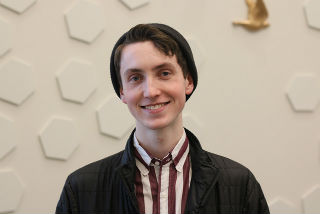
Riley Black
Riley Black, age 21, Major: Political Science, Honours, graduating 2019
When I first heard of the program, I thought it would be an excellent way to practically engage in reconciliation and community-building. I believe that bringing people of different backgrounds to learn together and share common experiences can bridge divided communities. I think this program gives students a unique opportunity to learn about our communities.
I’m hoping to gain a greater understanding of life in the inner-city and North End. I think these neighbourhoods are often misrepresented and misunderstood, and I want to be able to challenge these misrepresentations and misunderstandings. I also want to create relationships with a variety of people, so I can better understand and appreciate them and their experiences.
As a white settler Canadian, I believe it is my personal responsibility to listen to Indigenous voices. I believe this is a crucial aspect of reconciliation, and I’m looking forward to building new relationships and learning about reconciliation.
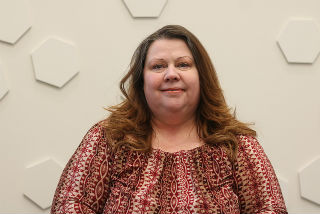
Heather Bourget
Heather Bourget – 56 years-old – pursuing a Bachelor of Arts Degree with a double major in Indigenous Studies and Urban and Inner City Studies and minoring in Conflict Resolution Studies, hoping to graduate by 2021
I am a mature student returning to school after 36 years of raising a family of six children and working. My work experience has been in child care (operating out of my home for seven years), the hospitality industry (ten years), retail, and general office work.
My life has been profoundly impacted learning the truth of our Canadian history and the ongoing oppressive policies and systems that continue to marginalize and oppress Indigenous peoples. I also marvel at the resiliency, courage, resourcefulness, and strength of peoples who continue to resist and forge out so many wonderful programs and networks. I consider myself to be an advocate of Indigenous issues and an ally to our Indigenous benefactors. I am passionate for change and use my learned knowledge to enlighten my peers, friends, family, children and grandchildren. I have a heart for Indigenous people in general and those who are oppressed in poverty, addictions, and mental health issues due to the generational traumas incurred. Reconciliation is dear to my heart and I am passionate about being part of the process which is why I became a facilitator for Circles for Reconciliation and continue to build relationships with Indigenous friends.
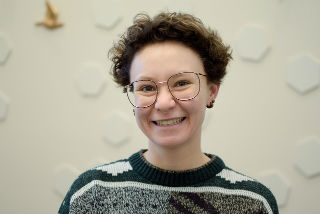
Brianna Brooks
Brianna Brooks, 20 years old, double major in Human Rights and Women and Gender Studies, graduating 2020
I wanted to participate in this exceptional program due to my passion for women’s rights and my recognition of the human rights violations caused by systemic racism and colonialism against Indigenous women and marginalized groups. Upholding the Truth and Reconciliation Commissions Calls to Action requires the participation of everyone in society, and it is my desire and responsibility to be a part of the reconciliation process and relationship-building processes with Indigenous groups in Canada.
I am hoping to take away from this experience a stronger sense of recognition of my own privilege and my responsibility as a continuing benefiter of modern day colonialism to marginalized groups and Indigenous women to work together to obtain reconciliation and conversation. I am hoping to learn more about the struggles Indigenous women face in Canada due to exploitation and objectification, as well as become educated on a collectivist culture that has prospered despite the overwhelmingly individualistic society Canada is today. I am also hoping to learn how to find my place in fighting against these human rights violations without taking up too much space on a situation that is not my own; learning how to be an ally, provide support, and uphold the Truth and Reconciliation Commissions Calls to Action is the most important thing to me.
Coming from an intersectional feminist background, I believe that reconciliation between female groups is an extremely unique thing. I believe reconciliation is naturally a timely process, but the unique relationship female groups tend to have with each other, in my opinion, can provide a remarkable opportunity for dialogue, empathy, and compassion.
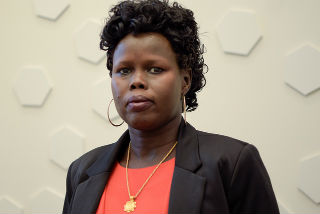
Rebecca Deng
Rebecca Atet Deng – Human Rights and Conflict Resolution – graduate in 2019
I arrived in Canada 12 years ago under refugee status and then become Canadian citizen. My goal is to work for impoverished refugee youth and women who do not have the available resources to empower themselves. I have been involved with the issues of human rights, empowerment and community development for several years and the program will help break barriers that immigrant women and youth encounter on a daily basis. I want to widen my knowledge and network and to learn the strategies that will help develop different skills. It will be good for me work within my community and inner-city of Winnipeg.
I would like to share some of the challenges immigrants face when they arrive. Social distress is one of the main factors within immigrant communities, especially in the families, many of whom were living in refugee camps. Some children arrive in Canada and never attended school in their homeland or in the refugee camps due to the war. Also, my journey and life experience as a former war survivor will make it easier for me to relate to the issues affected by youth and women of various background, especially First Nations and minorities.
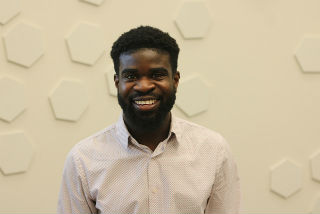
David Fanhbulleh
David Fanhbulleh, age 27, BA Majors in Human Rights and Political Science, graduate in fall 2018
YouthUnited@Winnipeg work and study portions provide an insightful experience based on the vast community involvement. So much of what reconciliation is, what it means to different groups, and the way it is understood is best learned in the field and from people directly involved within the community.
I hope to have contributed something meaningful and I hope to have learned firsthand from the student participants, organizations and those directly involved on the many issues facing both the immigrant and Indigenous community. For me, true Reconciliation involves a decentralization of power, meaning more responsibility, autonomy and self determination handed down to the Indigenous community.
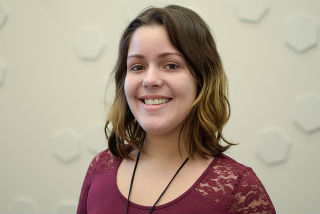
Irlanda Gomez
Irlanda Gomez, age 23, Honours Psychology and Developmental Studies, graduating June 2018
Although I’ve learnt lots during my university career, I believe there is nothing like hands-on experience. It is one thing learning about the issues many face in the City of Winnipeg, but is completely different to go out there and interact with real people, with real struggles, and support them and our communities, and work together to improve lives individually and the social well-being of neighborhoods.
I am hoping to become more culturally sensitive to the traditions and worldviews of First Nation communities, as well as other cultural groups. I am excited to learn from and connect with my classmates and the people in the community I will be working with. I am a new Canadian from Venezuela seven years ago. Arriving in Canada, I was surprised to encounter that, as an immigrant, I did not face racism and discrimination, but the First members of this country did. I am committed to fight discrimination so that no group has to suffer the diverse consequences of racism.
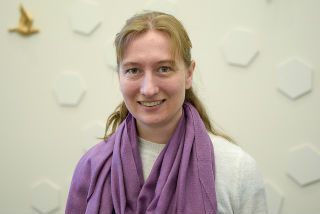
Lara Hunter
Lara Hunter, 25 years old, Urban and Inner City Studies, graduating in June 2019
I wanted to participate in this program because it combines work and classroom experiences which will help me gain a more robust understanding of how to fix issues facing the inner-city, and then put that understanding to the test in the workplace. I am looking forward to going to different classroom locations that will give me a chance to explore Winnipeg and gain new perspectives.
I hope to gain knowledge and strategies of community practices for citizen mobilization, engagement, and empowerment and then apply this to my workplace each week. I also want to gain more of a network within the inner-city that will help me with my future dreams of working in community development.
I am looking forward to learning what reconciliation means to other people and how to create a better community for everyone. I think an important aspect of reconciliation is learning and understanding multiple perspectives.
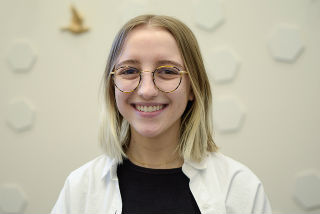
Kelly Kolt-Mackie
Kelly Kolt-Mackie, age 22, Urban and Inner City Studies, graduating 2019.
I have been studying and observing the many complexities of Winnipeg’s inner-city throughout my degree and feel as though working at an organization within the inner-city will allow for an experience that further strengthens that knowledge while also benefiting the community and its members.
I hope to learn more about the various community-based organizations in Winnipeg’s inner-city, the history and benefits to the community of the organization I am placed in, and to gain skills in order to help with future full-time employment with an inner-city organization. I also hope to learn from my peers and their experiences.
In order to reach the goal of reconciliation in Canada, a collective effort from everyone in this country is necessary. I feel as though it is the responsibility of settlers (such as myself) and newcomers to participate in any opportunity involving Indigenous-led reconciliation that we are given. Building strong and healthy relationships among Indigenous, settlers and newcomers is crucial in order to address all of the complex issues that have stemmed from Canada’s colonial history and work towards solutions.
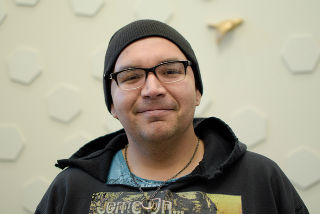
Gregory McIvor
Gregory McIvor, 35 years old, Urban and Inner City Studies, graduating 2020
I wish to instill possibilities for people to improve competency within themselves and to nurture well-being. I have obtained my community development diploma in college and I now look to develop new ideas with people that share the same ambition and resolve to help people within the inner-city; including rural and urban areas. I have been very intrigued and excited to learn what I can do because I feel it is important to build a world that fosters eco-energy and new forms of eco-technology. So, I am very intrigued that I was able to be a part of the YouthUnited spring/summer program. I am sure that there will be many great ideas and interesting people to learn from and share with. I look forward to applying my ability and skills. One day, I want the work I do to speak for itself. I feel it is important to give back and foster possibilities that are relevant, dynamic, and simple.
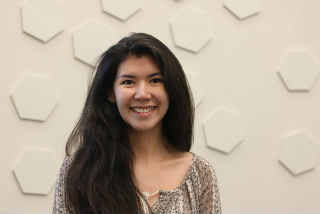
Chesney Spence
Chesney Spence, 20 years old, Criminal Justice, graduating 2019
I have always been concerned with the minority population of Winnipeg, specifically the inner-city and Aboriginal population because of the oppression and every day struggles these groups face. As a young Aboriginal woman myself, I wish to provide guidance and assurance back to the community. I believe that by working with YouthUnited I can develop a deeper understanding of how the inner-city works from a first-hand experience instead of learning about the struggles just through my criminal justice courses. I want to know what the people have to actually live through each day in Winnipeg. Additionally, I want to see where there is positivity I know exists in this city, because unfortunately we do not learn enough about the growth and change of Winnipeg in educational classes. With new-found relationships and understanding, reconciliation can begin. It all starts with building upon and reconstructing what foundations already exist so that we can create a better atmosphere for Winnipeg and hope for the inner-city.
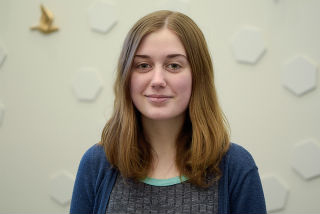
Nicole Sward
Nicole Sward, 20 years old, International Development Studies, graduating 2020
For years I have wanted to work in international development and travel the world combating issues like poverty and inequality. About a year ago I suddenly had an epiphany and realized that I could make the biggest impact by committing myself to working against the injustices experienced in my own community. I decided that I wanted to complement my studies in International Development with a local aspect and so the YouthUnited@Winnipeg summer program seemed perfect for me. This program stood out as it offers students the chance to learn through experience by participating in community development work rather than sitting in a classroom talking about development issues. I look forward to the opportunity to get my hands dirty and learn by working with a local organization while also getting the opportunity to give back to the community.
YouthUnited@Winnipeg will be an opportunity for me to gain valuable experience working with an organization within Winnipeg. I am hoping to learn more about how non-profit organizations and charities within the city operate as well as the impact their work is having on the community. I am hoping to learn more about how I can assist in community development work in the future and I am very excited to have the opportunity to learn through experience by working with an organization fighting for change and to learn from other students who are as passionate about community development as I am.
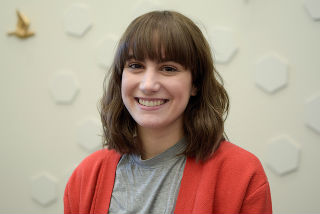
Maren Tait
Maren Tait, age 20, major in Human Rights, minor in Urban and Inner City Studies, graduating 2019
For as long as I can remember, I’ve been passionate about issues of poverty and homelessness. When I moved to Winnipeg from a small rural town, I became increasingly aware of the issues which impact those living in Winnipeg’s core. I am excited about this opportunity to work with people in the core at a grassroots level, as I am ready to apply theory to practice. I am committed to Winnipeg and am hopeful an opportunity such as this program can open doors for a possible future career in the city. I am looking forward to learning from those I am working with, and learning about how to empower and become an advocate for those in need. I believe working in the inner-city will help me gain more perspective about issues facing those in Winnipeg’s urban environment, and deepen my understanding of these issues. Reconciliation in our city is integral to creating more positive and empathetic relationships, and I look forward to being actively involved in the reconciliation process.
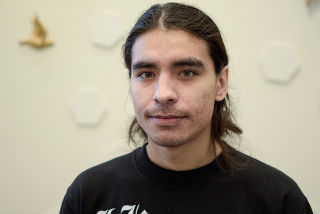
Sheldon Valiquette
Sheldon Valiquette – Sociology, graduating 2019
My home town is Poplar River First Nation, which is an isolated reserve located in northern Manitoba which is only accessible by plane or winter road. One of the reasons why I chose to participate in the Youth United program is because last semester I took the intro to urban inner city studies class and really enjoyed it. One of the things I enjoyed most about the intro to inner city studies class was learning about many of the community organizations in the inner city and I saw this program as the perfect opportunity to get involved with some of these organizations and learn more about how I can help them help others. Another reason why I chose to participate is because when I am done school I hope to work with communities and help fix some of the problems they deal with, and I saw this this as good work experience.
One of the things I hope to take from this program as a learning experience is knowledge about residential schools and its effects, as well as how to help fix some of these effects. The reason why I want to gain this knowledge is I can take some of it back to my home community, which is still dealing with many of the negative consequences that residential schools have brought.
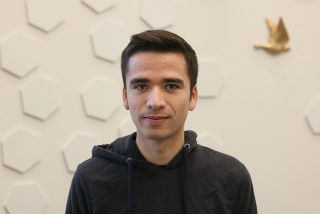
Kyle Walker
Kyle Walker, age 23, Business Administration, graduating 2018
I have taken courses where the themes are related to what YouthUnited stands for and I would like to apply these concepts to this summer program. I hope to make a difference in the community and enhance my understanding on reconciliation through this summer program. Living in Canada, I feel that it is important to recognize and not forget the history of how this country was formed, and because of this history it is import for communities to work together and work toward reconciliation.
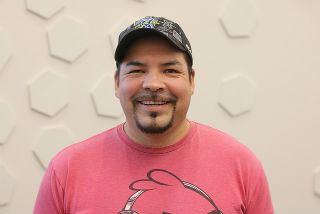
Borden Moneyas
Borden Moneyas – Urban and Inner-City Studies- will graduate in 2020
I want to share my experiences as a survivor of the effects of intergenerational trauma flowing from Residential Schools. I would also like to have an impact on other youth in the program who come from different walks of life, and regain the experience of re-connecting with my cultural roots. I want to gain a better understanding of restorative justice, and to enhance my community advocacy skills, and conflict resolution skills. I am currently trying to improve my relationships with my children because they have also been affected by intergenerational trauma. It is important that I build awareness and understanding in my family about reconciliation so that we can have a better future. I want to be an example in my community.

